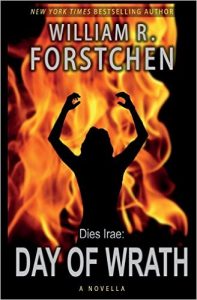 This is a book written on two levels. It works on one, and not on the other. As political polemic and call to action, it is quite good. As a novel, it is not very good.
This is a book written on two levels. It works on one, and not on the other. As political polemic and call to action, it is quite good. As a novel, it is not very good.
Fortschen made his name with the excellent “One Second After,” which highlighted the dangers to the country of an EMP attack. This book is Fortschen’s attempt to similarly highlight the dangers of a low-tech wide-scale terrorist attack, in this case on numerous schools and then on people rushing to the schools. Fortschen explicitly uses the 2004 Beslan school massacre, in which Chechen Muslims killed hundreds of Russian school children, as the template for his fictional attacks. (His telling of Beslan is even nastier than the mainstream account. His telling involves mass rape, including during killings. From my brief reading this is disputed and likely not true—but the reality was bad enough.)
The title is taken from the code words used for launch of the attack by the terrorists—“Dies Irae,” the title of the medieval hymn used at Catholic masses for the dead, focused on the actions of God, in all His three persons, of the Day of Judgment. It seems unlikely, though, that Muslim terrorists, if at all reflective, would choose as their code word a Christian term explicitly associated with the ultimate triumph of the Triune God.
As the author notes, schools are a logical terrorist target. They contain large numbers of people told to shelter in place until help arrives; killing children has a disproportionate impact; and schools are deliberately made totally defenseless by stupid gun-phobic policies. The type of terrorist attack Fortschen relates is plausible, in part because it is very low-tech. All it would require is dedication and competent coordination (which, in real life, is surprisingly lacking in terrorists). Of the plausible threats that we face, this is probably quite high on the list, and Fortschen performs a valuable service by highlighting it.
Unfortunately, the book is mostly a litany of horrors, not a novel. It occurs over one day, and mostly involves extreme and unpleasant violence described in detail. That’s Fortschen’s goal, to be sure. Sanitizing would reduce the desired impact. So, in service of his goal, technical details (including firearms usage) seem very accurate. But every character is wooden and stereotyped, and mostly incompetent. And the bad guys are incredibly competent and lucky, which is very unlikely in real life. But reflecting real life isn’t the goal here. Nor is the goal to get the reader to care about the characters—it’s to get him to care, or at least to be affected by, the message.
As Fortschen may or may not know, in much of the country there is at least some movement toward teaching schoolchildren how to react “better” to school shootings. Most of these new teachings (e.g., lock the door and hide where you can’t be seen; fight back if necessary; escape through the windows) might not work, but they’re better than the old “huddle and wait” teachings that contribute to the fictional carnage in this book. And I, and I suspect many parents, hammer into our children the need to make their own decisions and run, or take other action, if they deem it necessary, even if those in authority tell them to do the opposite. Finally, with millions more American civilians carrying guns every year, the ability to limit damage in such a scenario increases every year (although of course to avoid much of Fortschen’s scenario, common sense federal and state gun laws that encouraged adults to carry firearms in schools would be necessary). In practice, such a terrorist attack might not be as bad as portrayed in the book. But it would be bad enough.
My conclusion is that the book is worth reading, simply to hammer home the need to fight against stupid anti-firearm policies and to keep focused on the threat of Islamic terrorism. But it should also be read with a grain of salt as to its actual likelihood, and a pinch of optimism, as to an America moving to be a harder target.
